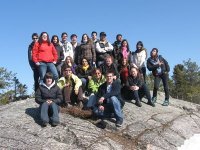Inter-linguistic, Inter-provincial and Even International Possibilities
A Virtual Team-teaching Project has been taking place between Cégep de Sept-Iles and Vanier College since 2005. The project’s pioneers, Sharon Coyle and Sophie Jacmin, are both Humanities teachers and coordinators. Their students would meet from their respective colleges online using webcams and projectors. This avant-garde approach, courage to use IT, and dedication were inspirations to me in my adventures in online team-teaching.
In June, 2007, I attended the AQPC Symposium where I stumbled upon Sophie’s and Sharon’s team-teaching presentation and round table. Interacting with students from a different region of the province intrigued me as well as the inter-linguistic (between Francophone and Anglophone cégeps), inter-provincial and even international possibilities! I expressed my hope to one day be part of a similar project with Sophie, and in January 2009, I had my first team-teaching experience with Sharon Coyle. This semester, I have happily become the coordinator of this venture.
In Winter 2009, my Humanities course Gender and Worldviews joined forces with Sharon’s. Her group of fifteen students and my group of thirty-two students met about seven times. Below are my views on some of the IT tools that we used:
- Mac iChat: This is a software program that permits people or groups to interact with each other through a big screen. At first, the students were shy to introduce themselves and hid behind their computers, but they quickly adjusted.
- Via eLearning and eMeeting Interactive platform: Here, students would meet with their webcams and headsets, in a small inter-collegial group. We assigned on-line work by posting a PowerPoint presentation containing a series of questions and activities whose objective was to discuss the differences and similarities in gender construction in urban and regional settings. The Via platform does not force students to speak because it has a “chat” option. For some of the personal issues, certain students preferred to chat instead of directly asking questions, although they could see one another.
- Auberge de jeunesse de Tadoussac: Our final meeting was live in April 2009 between three of Sharon’s studentsand seventeen of mine in Tadoussac. Our “Meeting Half-Way” trip to the land of the whales was exciting. We sang in the bus, played games, discussed gender issues, such as regional and urban gender stereotypes, did psychoanalytic tests and watched the Habs game. This was the first time that students from this project would meet live! After, we created a Facebook group called Vanier Meets Seven Isles in Tadoussac. Many students posted photos and comments.

Students in Tadoussac
Although our IT discussions were interesting, it was sometimes hard to get through an activity. Below are some barriers to effective online discussions that we noticed:
- The lab design and the positioning of the desks were not conducive to group work because the students sat in rows, as if they were at a desk in class. If the computers were back to back, students could at least interact face to face.
- While tech support was extremely useful at setting-up the camera and the computer before the virtual meeting, no one assured the quality of the actual on-line meeting session. Troubleshooting 32 students, I ran from one student to another, fixing their connections, their headsets, and their passwords on my own.
In order to resolve some of these issues, this semester, some former students will be peer-tutoring and helping out with IT. Such a project requires inter-departmental and inter-collegial commitment. In the long run government funding for such projects must take enhanced IT staff in the colleges into account.
This activity is still a pilot project, and although Sophie and Sharon are great mentors, I am far from mastering this technology and new way of teaching. We are still developing a modus operandi and we need more people to get involved. Having seen the value of this kind of teaching in an Anglophone to Anglophone environment, I see the potential for other projects in the future which could involve Anglophones and Francophones in virtual meetings.
At AQPC this year, I spoke to some faculty from the Francophone network who expressed interest in exploring activities such as virtual meetings to bring together the Anglophone and Francophone youth from this province.
- Would anyone be interested in joining or helping out in this project from either network?
- What ideas do you have for IT lab activities?
- What other ways to maintain contact besides Facebook can you think of?
- Are there IT people who have an idea how to make the Via connection shorter and easier?
Please share your views using the Reader Response Feature below.

